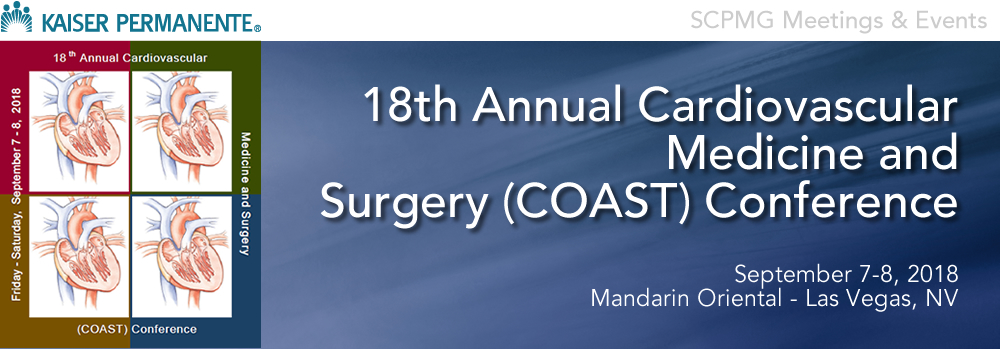DAY 1: FRIDAY, SEPTEMER 7, 2018
A Comparative Analysis of Current Lipid Treatment Guidelines
- Attendees will employ national lipid treatment guidelines.
- Attendees will utilize PCSK9 inhibitors for appropriate patients.
Controversy 1: Pre-treatment With DAPT is Not Necessary
- Attendees will stop using DAPT when the drawbacks outweigh the benefits.
Most Important Trials of 2018: CABANA, ODDYSSEY, VEST, SECURE, PCI, TREAT, BP IN Barbershops, Two Cardio Toxicity Trials, ANNEX-4, and Others
- Attendees will be up to date on the most important trials of 2018 in the cardiovascular domain, including new data on PCSK9i treatment outcome, utility of statin pre-treatment prior to PCI, the effectiveness of wearable defribrillators early after MI, and the first-in-class antidote for factor-Xa inhibitors.
Internalizing VAD: Challenges, Insights, and Learnings
- Attendees will employ best practices from the various Kaiser Permanente regions to offer patients ventricular assist device therapy.
Arterial versus Venous Grafts: Is there a Role for the Radial Artery and RIMA
- Attendees will be able to describe the rationale for choosing a radial artery or the right internal mammary artery (RIMA) as bypass conduit, and whether these alternatives to the usual saphenous vein graft are superior in outcome and worthwhile of the added surgery time and complexity.
Hemodynamic Support with Cardiac Surgery: IABP versus Impella versus ECMO
- Attendees will be able to discuss the risks and benefits of the currently available hemodynamic support devices and when to utilize one device in preference over the others.
Spontaneous Atrial Fibrillation: Treatment Strategies (NOAC, Ablation) and Reversal Agents
- Attendees will choose the most appropriate oral antithrombotic agent based on the particular atrial fibrillation patient’s balance of stroke and bleeding risk.
- Attendees will describe and prescribe the various reversal agents for the different novel oral anticoagulants.
Early Valve Thrombosis Post-TAVR: Incidence, Prognosis, and Management.
- Attendees will identify which patients with bioprosthetic valves (either through surgery or catheter) need longer anticoagulation.
- Attendees will diagnose heart valve thrombosis and describe treatment options.
Left Atrial Appendage Occlusion: Indications, Devices, Benefits, and Risks.
- Attendees will use strategies to determine which patients are appropriate candidates for left atrial appendage occlusion.
Heart Failure and Functional MR in the High-risk Patient: Medical Therapy versus Surgery versus Mitraclip
- Attendees will appropriately utilize new treatments such as the MitraClip procedure for severe mitral regurgitation.
Approaches to End-of-life Care in the Cardiac Patient: When to Prioritize Quality Over Quantity of Life
- Attendees will use strategies to have meaningful conversations with the patient and family regarding goals and preferences for end-of-life care.
- Attendees will appropriately utilize cardiovascular treatments, consistently with the patient’s wishes, towards the end of life.
DAY 2: SATURDAY, SEPTEMER 8, 2018
Driving and Syncope: Practical Tips and What You Need to Know.
- Attendees will report attendees with syncope to regulatory authorities as required by law.
Ventricular Arrhythmias & the Prevention of Sudden Cardiac Death: What is New in the Guidelines?
- Attendees will appropriately describe the notable updates to the cardiovascular guidelines.
Keynote: Choosing Wisely Campaign
- Attendees will describe the national initiatives that promote dialogue between clinicians and patients to ensure the delivery of evidence-based, cost effective care.
- Attendees will communicate with colleagues and patients the frequency of and risks associated with performing unnecessary medical tests and procedures.
Controversy 2: Is Utilization of the Pulmonary Artery Catheter Still Relevant in Patients Undergoing CABG and/or Single Valve Replacement?
- Attendees will describe the role of the pulmonary artery catheter in patients undergoing cardiac surgery and the evidence in support or against its routine use in this setting, including impact on surgical outcomes.
The Evolving Role of Hemodynamic Support and High-risk PCI
- Attendees will employ hemodynamic support devices for high risk PCI in appropriate patients.
- Attendees will employ other methods for hemodynamic support in high risk PCI in patients deemed not appropriate for support devices.
Transcatheter Treatment for Organic and Functional Mitral Valve Disease
- Attendees will describe novel transcatheter treatments for mitral valve replacement.
Research Highlight: The Strength and Limitations of ASCVD Risk Prediction
- Attendees will list pitfalls in current risk prediction models.
TVT Registry: What Have We Learned?
- Attendees will describe the transcatheter valve therapies registry and how this information has impacted patient care.
Controversy 3: Public Reporting of Outcomes Data: Lessons Learned and Future Direction
- Attendees will be able to recite the publicly reported quality metrics as well as the logic and background for the selection of these metrics. They will also understand what the potential downsides are in association with the reporting of these metrics.
Risks versus benefits & outcomes of monitored anesthesia care versus general anesthesia for TAVR
- Attendees will describe the patient characteristics and risk factors for monitored anesthesia care versus general anesthesia for transcatheter aortic valve replacement.
Multidisciplinary Approach to Thoracic Aortic Disease
-Attendees will describe the role of multidisciplinary teams in the management of patients with thoracic aortic disease.
-Attendees will employ the best practices of KP regions in the multidisciplinary management of patients with thoracic aortic disease. |



